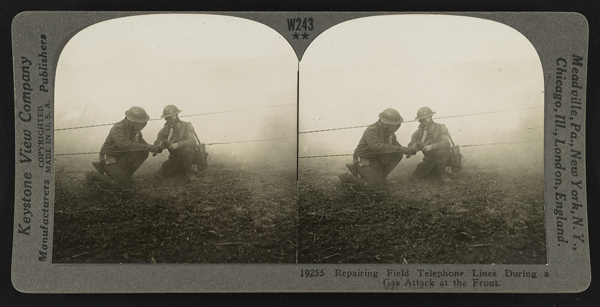Teach this Poem is a weekly series featuring a poem from our online poetry collection, accompanied by interdisciplinary resources and activities designed to help K-12 teachers quickly and easily bring poetry into the classroom.

The following activities and questions are designed to help your students use their noticing skills to move through the poem and develop their thinking about its meaning with confidence, using what they’ve noticed as evidence for their interpretations. Read more about the framework upon which these activities are based.
- Warm-up (quick write and pair share): With a partner, sketch at least three images that come to mind when you think about war.
- Before Reading the Poem (noticing and pair share): Look carefully at the image of the photograph of soldiers repairing a telephone wire. What do you notice first? With your partner or tablemates, discuss what you think is happening in the image. Look again. What else do you notice?
- Reading the Poem: Read the poem “Wirers” by Siegfried Sassoon silently. Notice the words and phrases that jump out at you, then think about what you noticed as you annotate the poem.
- Listening to the Poem (enlist two volunteers to read the poem aloud): Listen as the poem is read aloud twice, and write down any additional words and phrases that stand out to you. Call back the lines that you like by saying these lines aloud with your group.
- Small-group Discussion: Share what you noticed in the poem with your partner and another pair of students. Based on the details you just shared with your small group, what connections can you make between the poem and image? In what ways are they similar? Different? What emotions does the poem leave you with that the image doesn't convey?
- Whole-class Discussion: What do you think is meant by the phrase “wiring party?” How would you describe the wirers? Why might the poem end with the phrase “But we can say the front-line wire’s been safely mended”?
- Extension for Grades 7-8: Think about Young Hughes and the other soldiers on the front line. Write a postcard from the perspective of one of the soldiers writing home to someone they love or miss.
- Extension for Grades 9-12: Veterans Day is a holiday meant to honor those who have served the country in war.Research and read poems for Veterans Day. Choose to write an essay about the importance of writing about war or to emulate the style of one of the poems you encounter.
More Context for Teachers
In his 1920 introduction to Wilfred Owen’s Poems, Siegfried Sassoon writes, “His conclusions about War are so entirely in accordance with my own that I cannot attempt to judge his work with any critical detachment. I can only affirm that he was a man of absolute integrity of mind. He never wrote his poems (as so many war-poets did) to make the effect of a personal gesture. He pitied others; he did not pity himself. In the last year of his life he attained a clear vision of what he needed to say, and these poems survive him as his true and splendid testament.” Read more.
